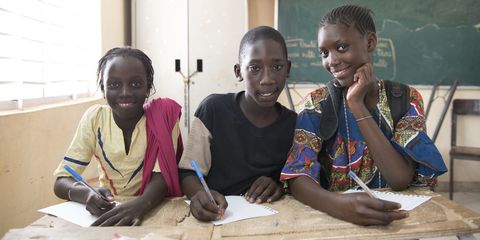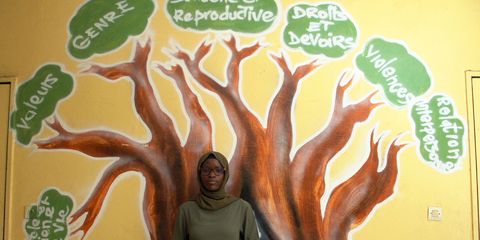Youth leader supports young women’s wellbeing and health
Youth leader Awa leads training sessions and offers guidance on reproductive and sexual health, child marriage, and gender based violence. She visits the community and engages with families, young people and community leaders, to educate and raise awareness on these issues, whilst advocating on the need for youth-led decision making and equality for girls.
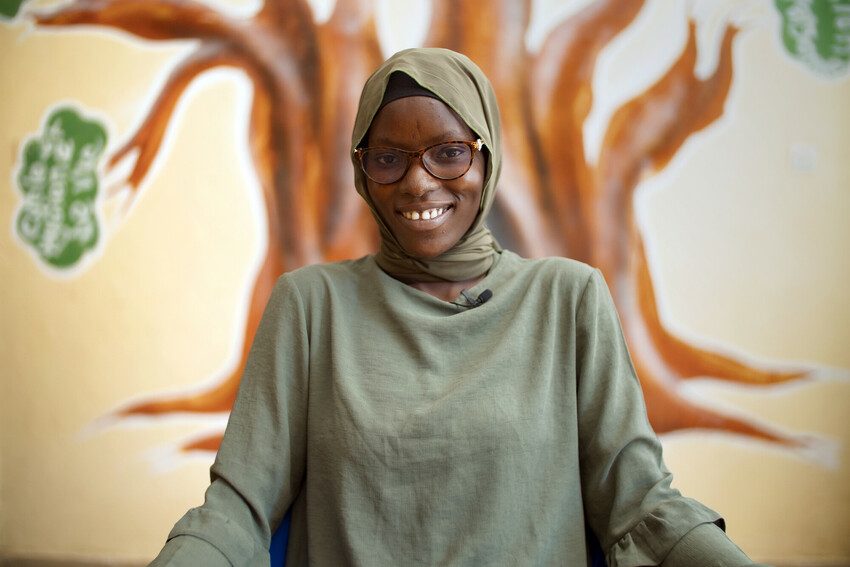
In urban Dakar, Plan International’s Sisters Create provides girls from poor neighbourhoods the opportunity to make art and music to influence change in their communities. At the centre, girls from across the city can take part in creative workshops such as theatre, painting, writing and music production.
Twenty-five-year-old Awa is one of the young leaders working at the centre. She joined the project in 2019 after taking part in a workshop and now helps run the teenage advice hub where she leads training sessions and offers guidance to the girls about the issues that might be troubling them such as reproductive and sexual health and gender based violence.
Menstrual hygiene, child marriage and teenage pregnancy
“A typical training session could be on the management of menstrual hygiene, that’s one of the themes that the Sisters Create project tends to develop with young people. There are others as well such as health problems, early pregnancy and child marriage problems,” explains Awa.
As well as running training courses at the centre, Awa also makes regular visits to Dakar’s suburbs where she engages with parents, young people and community leaders. “I would say that my motivation comes from my home visits. Once I met a young girl who was barely 16, pregnant and married. It was a case of child marriage and she got pregnant.”
“There was a girl who was married by force and whose parents had asked her to join her husband in his village. She called and asked for our help as she did not want to give up her education by going to another village.”
Awa
“When I checked her prenatal visit records, I saw that she had missed a lot of visits which had a big impact on her health. That’s when I decided to focus on youth health, especially those who are victims of child marriages and teenage pregnancies. This is where my motivation to help young people, girls in particular, comes from.”
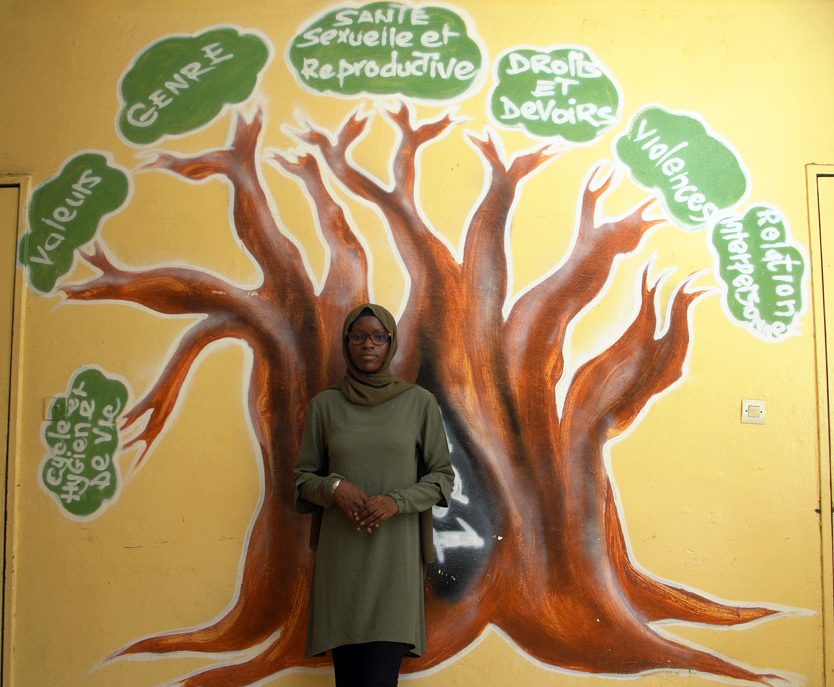
Recounting another case of child marriage, Awa says: “Recently, 3 days ago, there was a girl who was married by force and whose parents had asked her to join her husband in his village. She called and asked for our help as she did not want to give up her education by going to another village.”
“I think this is one of the key successes of the Sisters Create project, because today if we are called upon to help another girl, we will be able to help them. It means that our society knows that we are working on everything related to girls’ rights which creates a positive impact in our community.”
“I think this is one of the key successes of the Sisters Create project, because today if we are called upon to help another girl, we will be able to help them.”
Awa
Teaching healthy practices
Awa encounters many different health-related issues affecting girls in Senegal, including female genital mutilation which harms girls in many ways. The lack of information about their sexual and reproductive health and rights also means that many girls suffer from sexual infections and unwanted pregnancies.
“In Senegal, there are few structures dedicated to young people where they can go and take care of their health. So this is one of the major problems that girls and young people in general face,” shares Awa.
“In terms of change, I think that we are on the right path, but there is still a lot to do because we should already be working in collaboration with the decision-makers since they are the ones who can help us improve these health problems, especially by implementing appropriate structures with youth-friendly staff that would be ready to assist with health-related needs.”
Through the training workshops that Awa runs in communities and schools she is starting to see some progress. “We have conducted various activities where we teach girls to adopt healthy practices during their menstruation, since this is a problem that affects them at a young age and can lead to further problems in adulthood. It also affects their education as many girls do not go to school during their periods which often leads them to drop out of school.”
Entrepreneurship and personal development
As well as encouraging girls to adopt health lifestyles, Awa also offers training sessions on entrepreneurship and personal development. “I think that these are skills that young people need, especially those who are out of school. They need these kinds of training and skills in order to thrive.”
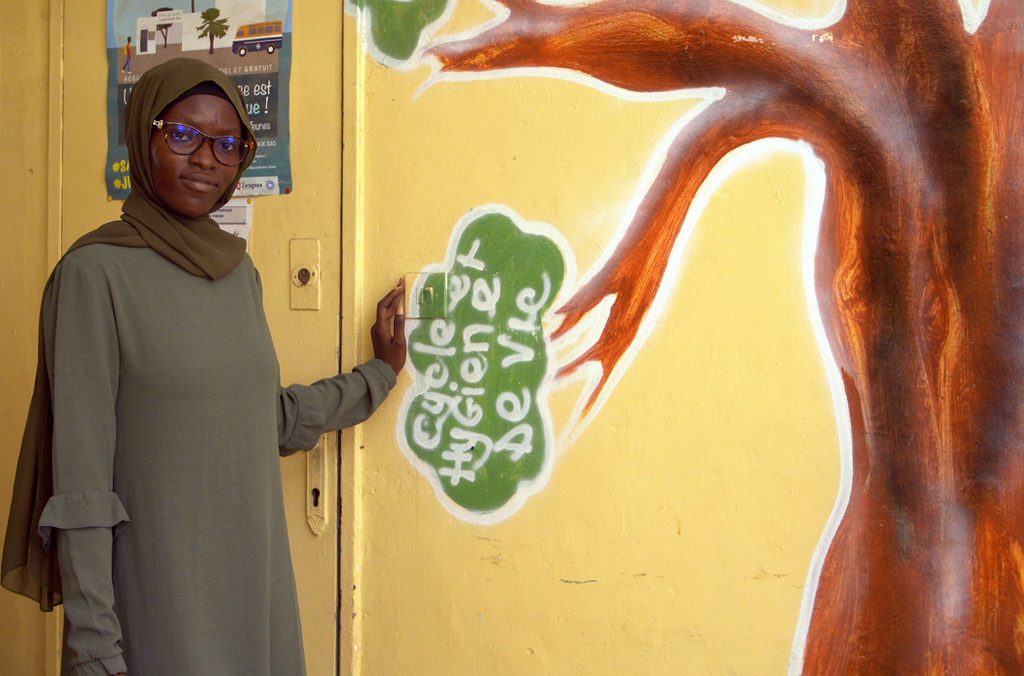
Youth-led decision making
Beyond training and skills development, Awa says that girls also need to have a voice in the decision-making structures that affect their lives. “Many decisions made for girls are not relevant, they are made without consulting the girls. I often like to mention my favourite saying: “Anything done for me, but without me, is against me.”
“We need to get girls involved in order to understand their needs, ailments and what they really want and what society is doing that doesn’t suit them. We need girls’ voices to be able to draw a clear future and help them stand on their own 2 feet. Young people must be part of neighbourhood committees and we have to eliminate all discrimination against them.”
“Anything done for me, but without me, is against me.”
Awa
“It should not be said that the young people are too young and not mature enough to make decisions. We have to demonstrate that we can make decisions, even if sometimes they are not the correct ones. We have a mind of our own and we can think for ourselves. Young people should represent themselves, they must stand up and take their place so that their voice is heard in the decision-making process within their society and neighbourhood.”
As Awa is now 25, she will soon leave the Sisters Create project and pass on the mantle to one of the younger girls at the centre. “My young sisters will become my successors. For that to happen, they will need guidance, just like I did. The Sister Create project includes artistic fields such as rap, painting, and theatre, but there are girls who have other talents besides rap, music, or painting.”
“Some would like to do sports, but it is stigmatised. It’s often said that girls should not do sports, it’s only for boys. I believe that we must give those girls a chance so that they can show their talents through their passion, they can do so just like the girls that do music and inspire other young girls to join this project, to expand it past urban Dakar and throughout all of Senegal.”
Categories: Protection from violence, Sexual and reproductive health and rights
